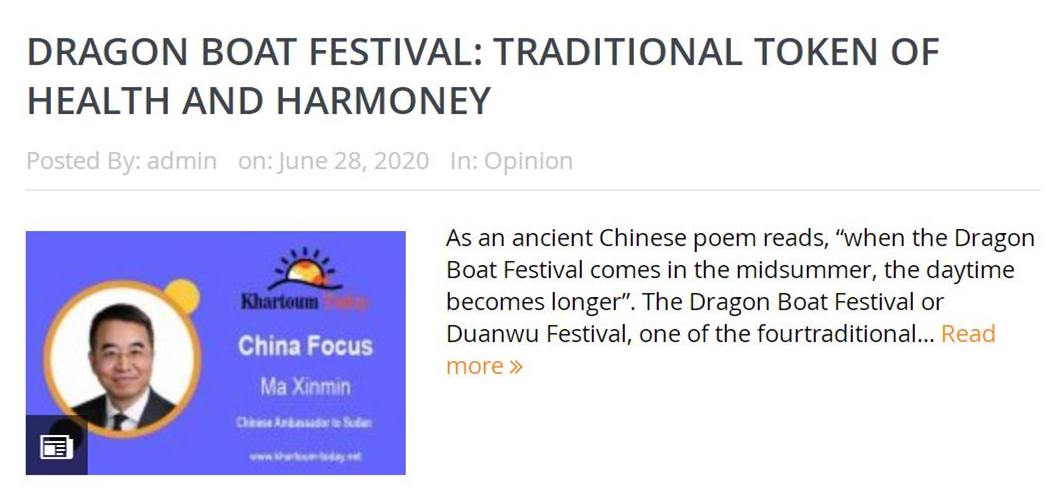On June 28th, Chinese Ambassador to Sudan Ma Xinmin publishes an signature article titled Dragon Boat Festival: Traditional Token of Health and Harmony for the China Focus Column on Khartoum Today. The full text is as follows:

As an ancient Chinese poem reads, “when the Dragon Boat Festival comes in the midsummer, the daytime becomes longer”. The Dragon Boat Festival or Duanwu Festival, one of the four traditional Chinese festivals, is observed with many traditional customs, ranging from eating sticky rice dumplings or zongzi in Chinese, hanging wormwood and calamus on doors to racing elaborately decorated dragon boats. The Dragon Boat festival falls on the fifth day of the fifth lunar month and on June 25 this year.
Having a rich history spanning over two millennia, the Dragon Boat Festival originated from the Warring States period and thrived in Sui and Tang Dynasties. It embodies Chinese people’s aspirations for warding off evil spirits and keeping fit, and displays the profound and diversified culture of Chinese sons and daughters. In China, it is also taken as “poet day”, “sports day” and “health day”.
It is a moment to recollect history and express patriotism. This illustrates the profound history of the Dragon Boat Festival. According to local legend, the patriotic poet Qu Yuan drowned himself in the Miluo River after he learned his motherland Chu State was invaded and captured, demonstrating his patriotism and loyalty. The locals who admired him raced out in their boats to retrieve his body and dropped rice balls into the river to distract fish from feeding on Qu’s body. And this is said to be the origin of various traditional customs of the Dragon Boat Festival, like dragon boat racing and making zongzi, that have been preserved in commemoration of the patriot Qu Yuan. Patriotic historic figures represented by Qu Yuan who are dedicated to serving the country with loyalty, even at the expense of their own lives, have been the cultural symbol imprinted on the mind of the Chinese nation. It symbolizes the most lofty and deepest patriotic sentiment among Chinese sons and daughters.
It is an occasion to embrace diversity and harmonious coexistence. This illustrates the great wisdom behind the Dragon Boat Festival. The Dragon Boat Festival enjoys the widest range of traditional customs among all traditional Chinese festivals. People that prefer tranquility incline to clean the courtyard, hang leaves of mugwort and calamus above doors, wear perfume sachets that help improve the mental state, and bathe in herbal spas that is believed to cure skin diseases. All of these represent the harmony between mankind and nature. People keen on excitement will race dragon boats, make paper cuttings, fly kites and entertain guests. The cultural diversity of traditional customs observed in the Dragon Boat Festival is the best testament that the Chinese civilization honors openness, inclusivity, harmony and cooperation. As a traditional Chinese poem goes, “the most joyful thing is to have a friend that knows your heart”. The Yangtze River and the Yellow River in China and the Blue Nile and the White Nile in Sudan have witnessed the development of the true friendship between China and Sudan over the past six decades since the establishment of the diplomatic relations. Both countries went through similar historical trials and hold the same dream for the future. The interactions and mutual learning between Chinese and Nubian civilizations will be bound to inject vitality to China-Sudan friendship in the future.
It is the timing to drive away diseases and evils and invoke good health and peace. This illustrates the practical significance of the Dragon Boat Festival. The fifth lunar month is traditionally considered as an unlucky month, as it is believed that during the midsummer, people can easily fall ill and epidemics can spread, especially with the breeding and prevalence of mosquitoes and flies. Racing dragon boats in a lively and colorful spectacle is an exercise that keep people physically fit. Decorating houses by hanging wormwood and angelica-perfumed fragrant sachets is aimed at helping purify the air and thus protecting people’s health. This reveals the ancient wisdom of the Chinese civilization in preventing diseases. Since the outbreak of the COVID-19 pandemic across the globe, China has been upholding the vision of building a global community of health for all with solidarity. At the virtual event of the opening of the 73rd World Health Assembly, Chinese President Xi Jinping announced five major initiatives aimed at boosting international cooperation against COVID-19. He also sent a reassuring message of China-Africa solidarity and cooperation at the Extraordinary China-Africa Summit on Solidarity against COVID-19. The anti-epidemic medical expert team sent by the Chinese government worked together with the Sudanese side for 15 days to exchange and share know-how on epidemic prevention and control, epidemiological surveys, clinical treatment and virus testing. The collective battle against COVID-19 between China and Sudan sets a good example of international cooperation in tiding over difficult times with unity in the face of severe challenges, and marks a vivid expression of the significance of building China-Sudan community of a shared future in the new era.
On the occasion of the Dragon Boat Festival, I would like to extend, on behalf of all colleagues of the Chinese Embassy in Sudan, kind regards and best wishes to Sudanese friends of various circles and the Chinese citizens in Sudan. Wish Chinese and Sudanese people good luck and health! And may China and Sudan defeat the coronavirus shoulder to shoulder and create a more splendid future together.
